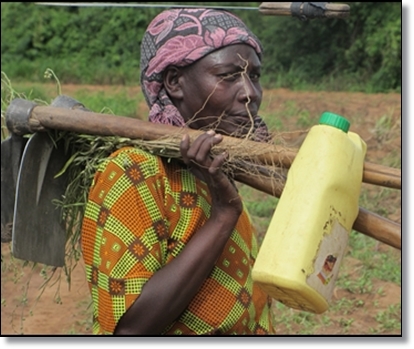What Aileth Uganda's Agriculture Sector?

 |
| Off to work -- a Ugandan farmer Photo courtesy |
Look! We have 365 days in a year. If an extension worker was working 7 days a week, it would take the worker a minimum 6.8 years to do just one round advisory visit to farmer households. So how many farmer households will see an extension worker in a given year? For 7 days of duty in a week, only 365 farmer households will see an extension worker in any given year. This gives us a percentage of approximately 15%. This is the state of affairs in Uganda today. The foregoing assumes that extension workers work for seven days and offer efficient advice to farmers, which in most cases is – anyway- just an assumption!
Fireplace conversations with farmers across Uganda reveal that the rural nature of most farm enterprises remains a challenge to graduates and fresh extension workers from college. These fresh professionals are reportedly keen on urban life rather than spending time with farmers. They are usually hanging out around trading centres watching premiership football and enjoying other trappings of peri-urban life. Are there mechanisms to measure results of extension service providers, who are paid wages from a public purse? Your guess is as good as mine.
How do we crack this state affairs? Do we leave solutions to policy makers and technocrats? Do we stop at calling for reinstatement and restoration of regional district farm demonstrations and stock farms? A solution may perhaps lie in harnessing private – private and public – private partnerships. There is for example a pool of Extension Link farmers that were trained in late 1990’s by Uganda National Farmers Federation (UNFFE) all over Uganda on Animal Husbandry and Agronomic practices. These extension link farmers can be easily indentified and retooled. They carry yellow and blue certificates bearing their credentials.
Can an alliance between the Farmers’ federation and NAADS bring down the current expansive farmer-extension worker ratio and bridge the current information gap at the farm level? There are other private sector companies like Mukwano and others that have trained and work with a cartel of highly trained and efficient extensionists. Can they be piggybacked on? Uganda’s government should coordinate and placate them for a national farmer extension services response.
By Morrison Rwakakamba
mrwakakamba@gmail.com
